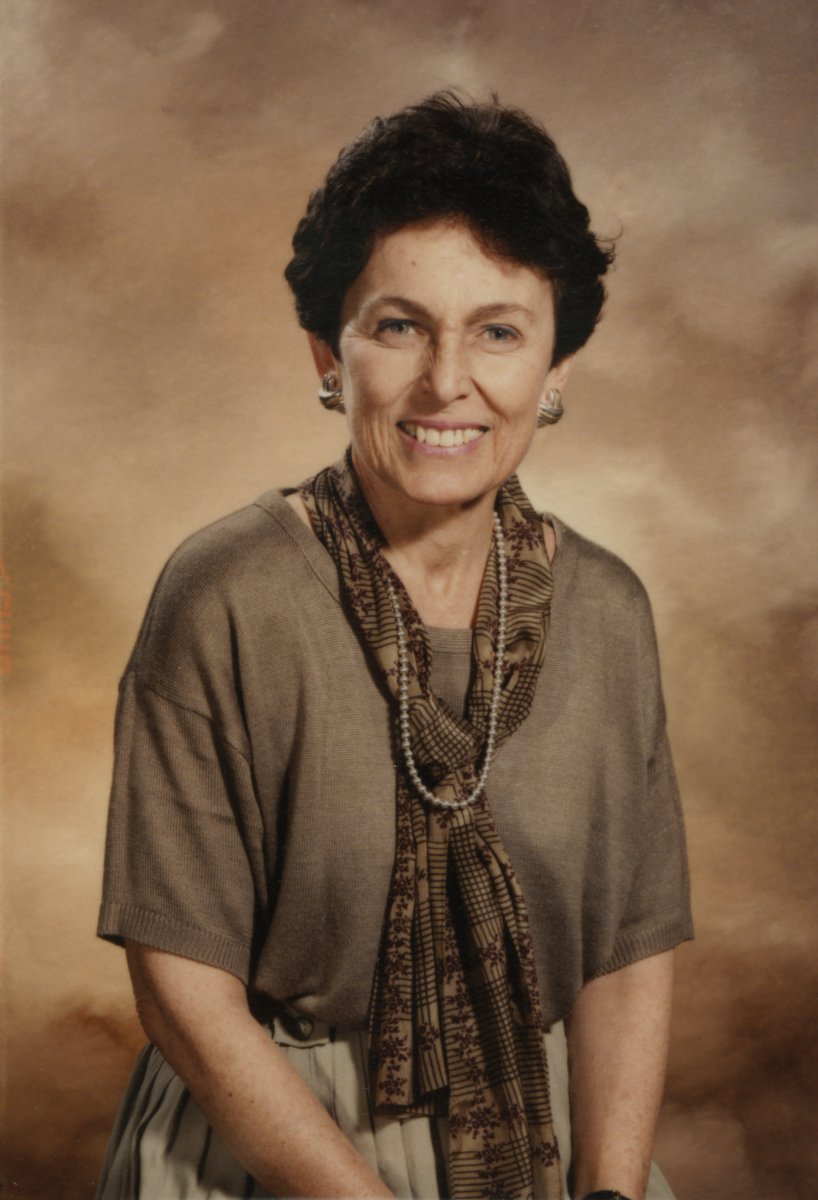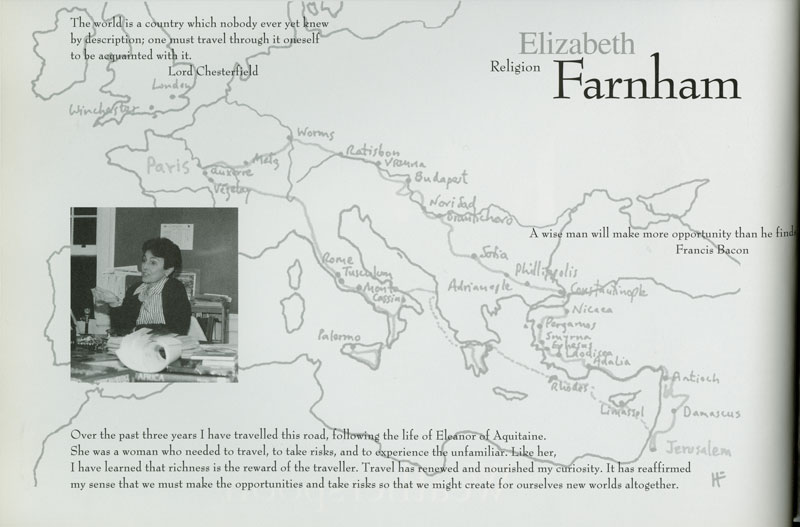ELIZABETH MOULTON FARNHAM ’46 (Hon.); P’92, P’92
1941-2021
 Chair of the Department of Religion, Instructor in Religion, Emerita
Chair of the Department of Religion, Instructor in Religion, Emerita
Elizabeth (Betsey) Moulton Farnham, died in Exeter on July 7, 2021, after a brief illness. Her memorial service on August 5 drew folks from near and far to Phillips Church on a stormy summer day. Former student Matt Carty ’90 noted, “Eulogies are tricky. Given how complicated people are, it’s almost impossible to boil down their essence in a way that either is satisfying or accurate. Attempts always seem to err either on the side of hyperbole or reduction, begging the question of how we can ever do justice to the whole person of anyone. I consider myself lucky this morning, knowing that I don’t need to do that. In truth I really have no intention of representing the whole of Mrs. Farnham…” Matt perfectly described the dilemma we share in capturing Betsey’s life, as he went on to describe the central role she had played as his adviser and that of his friends in Wentworth.
Born January 2, 1941 in New Haven, Connecticut, Betsey was the daughter of Jenni K. Moulton and the noted linguist, Professor William G. Moulton. Betsey received her undergraduate degree in Religious Studies (Philosophy of Religion) from Smith College in 1962, and wanted to join the then recently established Peace Corps. A lifelong battle with asthma thwarted that. She was fluent in German and French, but though she had no knowledge of Spanish she went off with characteristic enthusiasm and energy to Mexico for two years of teaching at the Colegio Americano de Torreon. She followed that with another even more adventurous year at the American College for Girls, in Istanbul, Turkey. It was there on a blind date that she met Hunter van Dorn Farnham, and after more graduate work at the Sorbonne in Paris, she and Hunter were married on September 3rd, 1966, in Vézelay, France. Betsey and Hunter moved to Washington D.C. where she became a beloved and respected teacher, and Hunter embarked on a distinguished career at the Agency for International Development. Their three children, Bill, ’92, Tim, ’92, and Lydia were born and raised there.
Betsey taught at the National Cathedral School, in Washington DC for 19 years, with courses in comparative religion and English. She was recruited by the Academy in 1987 to join the Religion Department. When Betsey interviewed, Peter Vorkink sent an advance copy of Betsey‘s résumé to Jack Heath, the then Dean of Faculty. In red ink on the cover page Peter had written “Jack--here is Betsey’s CV. Please do all you can to persuade her to come this September and not next, and don’t do anything to scare her off. She’s a gem.” Principal Tom Hassan noted in Betsey’s retirement citation, “Peter was right, you are a gem and fortunately, Jack did not scare you off. Thank you for 24 years of dedication and service to the Academy and best wishes to you and to Hunter as you enter retirement.”
That is a quick summary of Betsey’s life, but, as David Brooks notes, there is a difference between résumé virtues and eulogy virtues: the outward facts and skill sets of one’s life versus the inner person, one’s character. Betsey was a passionate teacher and school person, and her passions were many and deep. Perhaps in part because of her German heritage, she established and taught a course on the Holocaust and the nature of human evil for many years, and long before 9/11 she helped develop and taught a course on Islam. She was largely responsible for a Senior Studies course on Human Rights, and another on the New York Times, suggesting a global perspective on what an Exonian should know and care about. But her abiding passion was to help young people sort out who they each were as a person. Her best loved class on “Personhood and Belief” included for decades the writing of a meditation that explored the writer’s certainties and uncertainties, how those developed over time, and the ricochet between faith, broadly defined, and doubt, that many students live.
No wonder students wrote comments like this on the Exeter Facebook page:
- Betsey was my favorite teacher at Exeter. Her classes were wonderful, yes, but she also looked out for me in a way that no other adult at Exeter did.
- She was very important to all of us in the Indian Society. She was always so kind and supportive and her chocolate chip cookies were the best!
- Your Mom was one of my great teachers. She also orchestrated one of the greatest Harkness tables that I ever sat at. She had a gift in the classroom.
- Mrs. Farnham was such a wonderful soul and her loving energy helped me see the world with a positive perspective in my youth.
- Your mother was very kind and very important to me as a student as well as an alumna. She is the only teacher I can think of who saw I was hurting and promptly tried to help. I will always remember her very fondly.
- Your mom was a fierce and wise and wonderful woman.
- She was a teacher you had once but remembered for decades. Incredibly, she also seemed to remember your name and make you feel like you had equal impact on her life.
- Her classes inspired me to pursue my career in diplomacy and humanitarian affairs. She was very supportive - and believed in this introvert.
Betsey received the Brown Award in 1993 and the Rupert Radford Award in 1996, and was an honorary member of the Class of 1946. Her passions were equally clear around the department table where she sat with a group of a half a dozen colleagues who worked side-by-side for a quarter of a century, formulating and reformulating a religion curriculum that became the model and envy of other independent secondary schools in the nation. She served as Religion Department chair from 1990-1995, and was a trusted colleague for innumerable conversations about what and how we teach.
Her service to the school outside of her classroom in Academy 205, which had been Frederick Buechner’s classroom as well, was legion. She was Director of the Stratford program twice, in 2000 and again in 2006. She was on many faculty committees, too numerous to name, but notably she chaired for several years the MLK Day committee as well as the Residential Life Steering Committee, advocating for renovations that would bring a greater sense of community to the dorms and dining halls.
She lived in Wentworth Hall for 14 years, before moving to 74 Front Street, where in each case she and Hunter were gracious hosts for visiting scholars and assembly speakers. Hunter became a force on campus in his own right, advising multiple student clubs including the Model UN and the winning Granite State Challenge team. Eventually they moved to their own home on Gill Street.

Betsey lived at the confluence, and sometimes the collision, of evolving worldviews. Though she helped steer the department out of the Christian-centered frame that was prevalent when she arrived, she was still traditional when it came to dress and conduct and speech. She was one of the last defenders of the dress code and preferred to be called Mrs. Farnham over Ms., and yet when the play The Vagina Monologues was performed in Fisher Theater, there was Betsey playing a role on stage—as present as she had been when the issue of gay rights came up for the school, as she was when any matter of human rights came up. Sometimes these values clashed in ways that were difficult for her to bring together, and yet so often she found the thread that linked them and followed it, without losing the essence of who she was. And there was a lighter side to her as well—she shared many humorous moments with colleagues, and her children remember watching the famous cake fight scene from a Three Stooges movie. At the end, as Tim noted in his Phillips Church eulogy, Betsey baked cupcakes for all. “There was frosting on the walls, the floor, in our hair, on our faces and clothes, and the four of us were giggling and laughing so hard we were crying and smiling at the same time.”
Betsey had hoped to join Hunter in his retirement, but sadly and tragically he died not long after she retired in 2011. She lived a decade alone on Gill Street until her death this past summer, with former students and faculty colleagues visiting often. In a career that spanned forty-eight years of teaching, the students were right next to her family in her heart, centering a long life, well-lived and well-loved.
Respectfully submitted,
Kathy Brownback
Jamie Hamilton
Tom Ramsey
Peter Vorkink, chair
I move that this faculty minute be spread upon the minutes of the faculty meeting, and a copy be sent to Betsey’s three children.
Editor's note: This is a full, unedited version of this Memorial Minute. A version of this article first appeared in the spring 2022 issue of The Exeter Bulletin.
